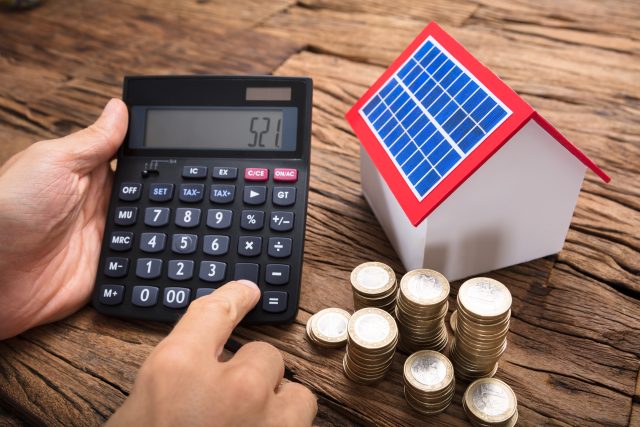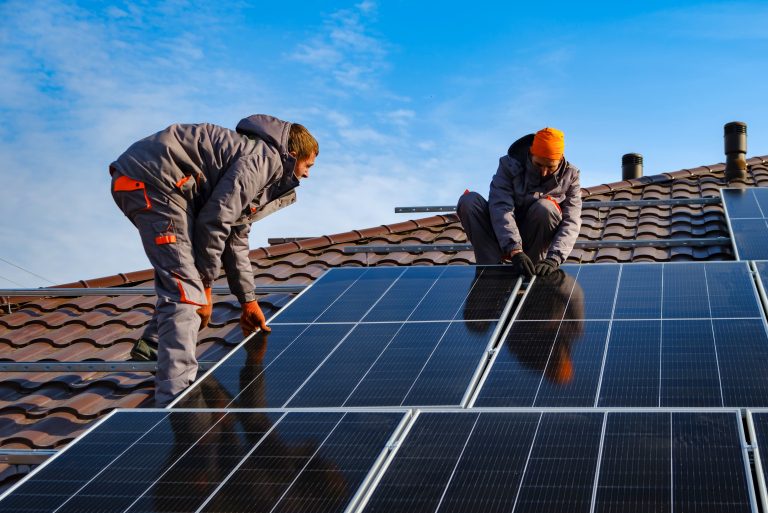Guide to Solar Panels for Homes: Going Solar
If you’re a homeowner or landlord in New Mexico, you may be considering solar as a way to control energy costs, save money, and reduce your environmental impact. In this article, we’ll walk you through everything you need to know to make an informed decision about going solar at your home. Let’s dig in, shall we?
Is My Home Suitable For Solar Panels?
As you consider going solar at your home, one of the first questions you may have is whether your home is suitable for solar panels. After all, you want to ensure that your solar investment will pay off and provide you with the energy savings and environmental benefits you’re looking for.
So, how can you determine whether your home is suitable for solar panels? Here are a few things to consider:
Roof Orientation
Solar panels are most effective when installed on a south-facing roof with minimal shading. This is because south-facing roofs receive the most direct sunlight throughout the day, allowing your solar panels to generate maximum power.
If your roof doesn’t face south or is heavily shaded, you may still be able to go solar, but you will need to go over your options with a solar consultant, including installing a ground mount.
Roof Condition
Before installing solar panels, it’s essential to ensure that your roof is in good condition. If your roof is old or needs repair, it may be more cost-effective to address these issues before installing solar panels or include a new roof with your solar loan. This is because solar panels have a 25-30 year lifespan, so you’ll want to ensure that your roof will last for the same amount of time.
Home Size And Energy Needs
Your home’s size and energy needs will also influence whether your home is suitable for solar panels. A larger home with higher energy consumption will require more solar panels to meet its energy needs, which may not be feasible if you have limited roof space.
However, even if you have a small home or low energy consumption, you may still be able to go solar with a smaller solar panel system.
How Will Solar Impact The Resale Value Of My Home?
According to the National Renewable Energy Laboratory, homes with solar panels tend to sell faster and at a higher price than comparable homes without solar.
This is because solar panels can save homeowners significant money on their energy bills, which can be an attractive feature for potential buyers. Additionally, solar panels can help reduce a home’s carbon footprint, which is increasingly important to many buyers.

Image Credit: Andrey_Popov / Shutterstock
Will I Save Money By Going Solar?
One of the main reasons homeowners go solar is to save money on their energy bills. And in many cases, going solar can indeed save homeowners significant amounts of money over time.
The amount of money you’ll save by going solar depends on various factors, including the size of your home, your energy consumption, the cost of electricity in your area, and the size and efficiency of your solar panel system. However, on average, homeowners who go solar can save thousands of dollars over the life of their solar panel system.
Can I Get Financing For Solar?
If you’re worried about the upfront cost of going solar, several financing options are available to help you pay for your solar panel system. One option is to take out a loan to pay for the solar panels and pay off the loan over time. Another option is to take advantage of solar leases or power purchase agreements (PPAs).
While solar leases and PPAs can be a good option for some homeowners, we highly recommend that our customers own their solar panels rather than entering into a lease or PPA. The attorney general of New Mexico has sued a solar company for doing PPAs in recent years, and many New Mexicans are hesitant to go solar with companies that offer these types of agreements.
How Can You Find State Incentives And Tax Breaks That Will Help You Go Solar?
Several state incentives and tax breaks are also available to homeowners who go solar. For example, in New Mexico, homeowners who install solar panels may be eligible for a state income tax credit and a property tax exemption in addition to the current federal tax credit.
It’s important to do your research and find out what incentives and tax breaks are available in your state. This can help make going solar more affordable and help you save even more money over time.
How Much Power Can I Generate With Solar?
The amount of power you can generate with solar panels depends on several factors, including the size of your solar panel system, the efficiency of your panels, and the amount of sunlight your home receives.
To give you an idea of the potential power generation of a solar panel system, a typical solar panel system for a home in New Mexico will generate around 4,000 kilowatt-hours (kWh) of electricity per year. This is enough to power the average home in New Mexico for about half a year.
Of course, the amount of power you generate with your solar panel system will depend on your circumstances. A professional solar installer like Poulin Solar Pro can help you determine the best size and configuration for your solar panel system based on your energy needs throughout the year and budget.
How Do I Start The Process Of Going Solar?
If you’re ready to go solar, the first step is to find a reputable solar installer like Poulin Solar Pro. We are a trusted, family-owned company with over 40 years serving New Mexican homeowners in home remodeling needs and solar energy since 2015.
Once you’ve chosen a solar installer, they will perform a site assessment to determine the feasibility of solar at your home and provide you with a proposal outlining the details of your solar panel system and the associated costs.
Can I Install Solar Myself?
While it is technically possible to install solar panels yourself, it is generally not recommended for several reasons. First, installing solar panels requires a high level of technical knowledge and expertise. If you’re not familiar with electrical systems and solar panel installation, it’s easy to make mistakes that can be dangerous and costly to fix.
Second, installing solar panels requires specialized tools and equipment that most homeowners don’t have.
Finally, by working with a professional solar installer like Poulin Solar Pro, you can take advantage of our experience and expertise, as well as our warranties and guarantees, to ensure that your solar panel system is installed correctly and performs optimally for years to come.
Where Can I Find Other Resources To Learn About Going Solar?
Several resources are available if you have more questions about going solar or want to learn more about the process. One great place to start is by talking to a professional solar installer like Poulin Solar Pro. We have the knowledge and expertise to answer all of your questions and help you make an informed decision about going solar.
In addition, many online resources can help you learn more about solar panels and the process of going solar. Some good places to start include the U.S. Department of Energy’s website on solar energy and the Solar Energy Industries Association’s website.
If you’re ready to take the next step towards going solar, we encourage you to contact Poulin Solar Pro today. As the #1 rated solar company in New Mexico by the country’s most significant solar info company, we have the experience and expertise to help you go solar.
Plus, with over six years in business and a commitment to educating our clients about financing options, we’re here to help you every step of the way. Contact us today to learn more!
Featured Image: AlyoshinE / Shutterstock

